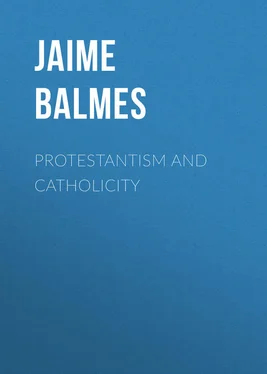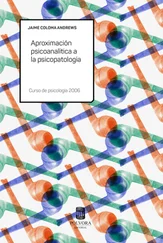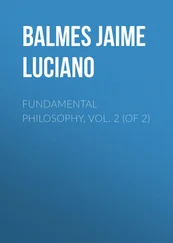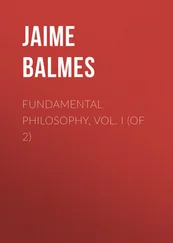Jaime Balmes - Protestantism and Catholicity
Здесь есть возможность читать онлайн «Jaime Balmes - Protestantism and Catholicity» — ознакомительный отрывок электронной книги совершенно бесплатно, а после прочтения отрывка купить полную версию. В некоторых случаях можно слушать аудио, скачать через торрент в формате fb2 и присутствует краткое содержание. Жанр: foreign_antique, foreign_prose, на английском языке. Описание произведения, (предисловие) а так же отзывы посетителей доступны на портале библиотеки ЛибКат.
- Название:Protestantism and Catholicity
- Автор:
- Жанр:
- Год:неизвестен
- ISBN:нет данных
- Рейтинг книги:3 / 5. Голосов: 1
-
Избранное:Добавить в избранное
- Отзывы:
-
Ваша оценка:
- 60
- 1
- 2
- 3
- 4
- 5
Protestantism and Catholicity: краткое содержание, описание и аннотация
Предлагаем к чтению аннотацию, описание, краткое содержание или предисловие (зависит от того, что написал сам автор книги «Protestantism and Catholicity»). Если вы не нашли необходимую информацию о книге — напишите в комментариях, мы постараемся отыскать её.
Protestantism and Catholicity — читать онлайн ознакомительный отрывок
Ниже представлен текст книги, разбитый по страницам. Система сохранения места последней прочитанной страницы, позволяет с удобством читать онлайн бесплатно книгу «Protestantism and Catholicity», без необходимости каждый раз заново искать на чём Вы остановились. Поставьте закладку, и сможете в любой момент перейти на страницу, на которой закончили чтение.
Интервал:
Закладка:
CHAPTER VIII.
FANATICISM – ITS DEFINITION. – FANATICISM IN THE CATHOLIC CHURCH
It would be unjust to charge a religion with falsehood, merely because fanatics are to be found within its bosom. This would be to reject all, because none are to be found exempt from them. A religion, then, is not to be condemned because it has them, but because it produces them, urges them on, and opens a field for them. If we observe closely, we shall find at the bottom of the human heart an abundant source of fanaticism; the history of man affords us many proofs of this incontestable truth. Imagine whatever delusion you please, relate the most extravagant visions, invent the most absurd system, if you only take care to give to all a religious coloring, you may be sure that you will have enthusiastic followers, who will heartily devote themselves to the propagation of your doctrines, and will espouse your cause blindly and ardently; in other words, you will have under your standard a troop of fanatics.
Philosophers have devoted many pages to declamation against fanaticism; they have, as it were, assumed the mission of banishing it from the earth. They have tired mankind with philosophical lectures, and have thundered against the monster with all the vigor of their eloquence. They used the word, however, in so wide a sense as to include all kind of religion. But, if they had confined themselves to attacking real fanaticism, I believe they would have done much better if they had devoted some time to the examination of this matter in an analytic spirit, and had treated it, after so doing, maturely, calmly, and without prejudice.
Inasmuch as these philosophers were aware that fanaticism is a natural infirmity of the human mind, they could, if they were men of sense and wisdom, have had little hope of banishing the accursed monster from the world by reasoning and eloquence; for I am not aware that, up to the present time, philosophy has remedied any of the important evils that afflict humanity. Among the numerous errors of the philosophy of the eighteenth century, one of the principal was the mania for types; there was formed in the mind a type of the nature of man, of society, in a word, of every thing; and every thing that could not be adjusted to this type, every thing that could not be moulded into the required form, was so subjected to the fury of philosophers, as to make it certain, at least, that the want of pliability did not go unpunished.
But do I mean to deny the existence of fanaticism in the world? There is much of it. Do I deny that it is an evil? It is a very great one. Can it be extirpated? It cannot. How can its extent be diminished, its force weakened, and its violence checked? By directing man wisely. Can this be done by philosophy? We shall presently see. What is the origin of fanaticism? We must begin by defining the real meaning of the word. By fanaticism is meant, taking the word in its widest signification, the strong excitement of a mind powerfully acted on by a false or exaggerated opinion. If the opinion be true, if it be confined within just limits, there is no fanaticism; or, if there be any, it is only with respect to the means employed in defending the opinion. But in that case there is an erroneous judgment, since it is believed that the truth of the opinion authorizes the means; that is to say, there is already error or exaggeration. If a true opinion be sustained by legitimate means, if the occasion be opportune, whatever may be the excitement or effervescence of mind, whatever may be the energy of the efforts and the sacrifices made, then there is enthusiasm of mind and heroism of action, but no fanaticism. Were it otherwise, the heroes of all times and countries might be stigmatized as fanatics.
Fanaticism, in this general sense, extends to all the subjects which occupy the human mind; thus there are fanatics in religion, in politics, even in science and literature. Nevertheless, according to etymology and custom, the word is properly applied to religious matters only; therefore the word, when used alone, means fanaticism in religion, whilst, when applied to other things, it is always accompanied by a qualifying epithet; thus we say political fanatics, literary fanatics, &c.
There is no doubt that in religious matters men have a strong tendency to give themselves to a dominant idea, which they desire to communicate to all around them, and propagate everywhere. They sometimes go so far as to attempt this by the most violent means. The same fact appears, to a certain extent, in other matters; but it acquires in religious things a character different from what it assumes elsewhere. It is there that the human mind acquires increased force, frightful energy, and unbounded expansion; there are no more difficulties, obstacles, or fetters; material interests entirely disappear; the greatest sufferings acquire a charm; torments are nothing; death itself is a seductive illusion.
This phenomenon varies with individuals, with ideas, with the manners of the nation in whose bosom it is produced; but at bottom it is always the same. If we examine the matter thoroughly, we shall find that the violences of the followers of Mahomet, and the extravagant disciples of Fox, have a common origin.
It is with this passion as with all others; when they produce great evils, it is because they deviate from their legitimate objects, or because they strive at those objects by means which are not conformable to the dictates of reason and prudence. Fanaticism, then, rightly understood, is nothing but misguided religious feeling; a feeling which man has within him from the cradle to the tomb, and which is found to be diffused throughout society in all periods of its existence. Vain have been the efforts made up to this time to render men irreligious; a few individuals may give themselves up to the folly of complete irreligion; but the human race always protests against those who endeavor to stifle the sentiment of religion. Now this feeling is so strong and active, it exercises so unbounded an influence on man, that no sooner has it been diverted from its legitimate object, and quitted the right path, than it is seen to produce lamentable results; then it is that two causes, fertile in great disasters, are found in combination, complete blindness of the understanding and irresistible energy of the will.
In declaiming against fanaticism, many Protestants and philosophers have thought proper to throw a large share of blame on the Catholic Church; certainly they ought to have been more moderate in this respect if their philosophy had been good. It is true the Church cannot boast of having cured all the follies of man; she cannot pretend to have banished fanaticism so completely as not to have some fanatics among her children; but she may justly boast that no religion has taken more effectual means of curing the evil. It may, moreover, be affirmed, that she has taken her measures so well, that when it does make its appearance, she confines it within such limits that it may exist for a time, but cannot produce very dangerous results.
Its mental errors and delirious dreams, which, if encouraged, lead men to the commission of the greatest extravagances and the most horrible crimes, are kept under control when the mind possesses a salutary conviction of its own weakness and a respect for infallible authority. If they be not extinguished at their birth, at least they remain in a state of isolation, they do not injure the deposit of true doctrine, and the ties which unite all the faithful as members of the same body are not broken. With respect to revelations, visions, prophecies, and ecstasies, as long as they preserve a private character and do not affect the truths of faith, the Church, generally speaking, tolerates them and abstains from interference, leaving the discussion of the facts to criticism, and allowing the faithful an entire liberty of thinking as they please; but if the affair assumes a more important aspect, if the visionary calls in question points of doctrine, she immediately shows her vigilance. Attentive to every voice raised against the instructions of her Divine Master, she fixes an observant eye on the innovator. She examines whether he be a man deceived in matters of doctrine or a wolf in sheep's clothing; she raises her warning voice, she points out to all the faithful the error or the danger, and the voice of the Shepherd recalls the wandering sheep; but if he refuse to listen to her, and prefer to follow his own caprices, she separates him from the flock, and declares him to resemble the wolf. From that moment all those who are sincerely desirous of continuing in the bosom of the Church, can no more be infected with the error.
Читать дальшеИнтервал:
Закладка:
Похожие книги на «Protestantism and Catholicity»
Представляем Вашему вниманию похожие книги на «Protestantism and Catholicity» списком для выбора. Мы отобрали схожую по названию и смыслу литературу в надежде предоставить читателям больше вариантов отыскать новые, интересные, ещё непрочитанные произведения.
Обсуждение, отзывы о книге «Protestantism and Catholicity» и просто собственные мнения читателей. Оставьте ваши комментарии, напишите, что Вы думаете о произведении, его смысле или главных героях. Укажите что конкретно понравилось, а что нет, и почему Вы так считаете.












